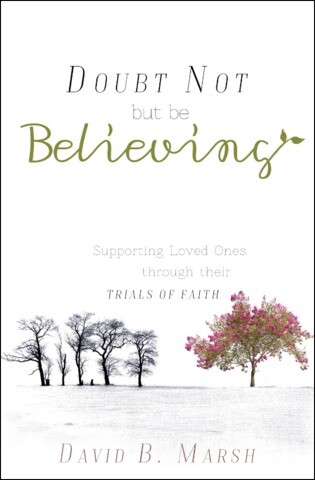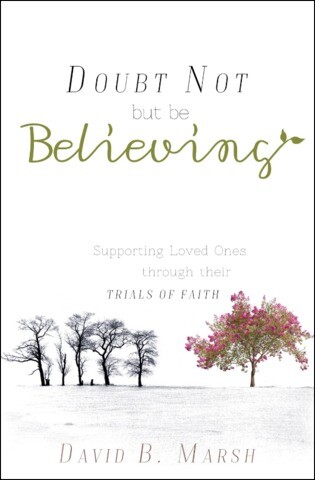We seem to be living in a time when many have doubts about the truthfulness of the Church. Virtually everyone knows someone who is doubting. Many leaders report having interviews with members who are struggling. Parents heartbreakingly watch children leave the Church and feel powerless to help. While the choice to leave the Church lies with our loved ones, there are things we can do to support them and help them dissolve their doubts.
Show Compassion
An episode in the Savior’s life demonstrates how He showed compassion for someone who was doubting.
Early in the morning, Jesus miraculously walked on water to meet His disciples who were in a ship on the Sea of Galilee. Peter could not wait for the Savior to arrive at the ship and requested, “Lord, if it be thou, bid me come unto thee on the water.” The Savior agreed. “And when Peter was come down out of the ship, he walked on the water, to go to Jesus. But when he saw the wind boisterous, he was afraid; and beginning to sink, he cried, saying, Lord, save me. And immediately Jesus stretched forth his hand, and caught him” (Matthew 14:26–31).
I suppose the Savior could have left the sinking Peter to struggle in order to teach him a lesson. But He didn’t. He immediately and compassionately “stretched forth His hand, and caught him.” When we see a loved one struggling with doubt, we should immediately and compassionately stretch forth our best efforts to help them.
As Jesus drew Peter from the water, He asked a simple, yet profound question: “O thou of little faith, wherefore didst thou doubt?” (Matthew 14:31). At first, this question may seem unsympathetic. But, the word wherefore means, “the point reached or entered” in the original Greek (Strong’s Exhaustive Concordance of the Bible, s.v., “G1519 eis”). In essence, Jesus was asking, “How did you reach the point of doubting?” The Lord was not chastising Peter as much as He was asking him to look within himself and figure out how he got to the point of doubting. How was it that he walked on water for a time but then sank? Something changed within Peter and the Lord wanted him to figure out what it was.
The Lord knew that doubt was destroying Peter’s faith and He wanted Peter to overcome his doubt before it caused any further spiritual damage. No wonder the scriptural commands about doubting are so absolute. Moroni declared, “Doubt not, but be believing” (Mormon 9:27). “Doubt not, fear not,” said the Savior (D&C 6:36).
Because doubt is the mortal enemy of faith, the sooner we help our doubting friends and loved ones sincerely look inside themselves and identify the source of their doubt, the quicker they can dispel those doubts and preserve their faith. Just as a doctor can more precisely offer a cure for a malady by knowing what caused it, our friends and family can better dissolve their doubt by knowing its source.
People experiencing doubt often feel unworthy or sinful. When we show compassion, rather than being judgmental, we show them they have someone who understands and who will patiently walk beside them as they work through their doubts. Jesus treated those who doubted with compassion. We can follow His example.
Fortify Faith
Fortifying faith is essential for our loved ones and friends who experience doubt. Diminished faith is the underlying cause of a decaying testimony. President Thomas S. Monson taught, “May we choose to build up within ourselves a great and powerful faith which will be our most effective defense against the designs of the adversary” (“Choices,” Ensign, May 2016, 86). Here are some things you can do to fortify the faith of those who are besieged by doubt.
First, let them know that it is okay to experience doubts. It is a common human experience and it does not mean that they are wicked or weak. Show them love, communicate understanding, and exercise patience. Many have fortified their faith and received greater understanding by seeking answers to questions and striving to overcome doubts. But also warn them not to let those doubts linger. Lingering doubt destroys faith. Remind them that the Lord wants to help them. He is ever merciful and able to succor them in their time of need (see Alma 7:11–12; D&C 62:1).
Second, encourage them not to leave the Church or to forget what they know by the power of the Holy Ghost to be true. Help them see how unwise it would be to dismiss all the precious principles of the gospel because they encounter seemingly troubling historical information or have negative encounters with other members or leaders. It would be tragic to lose the guidance of a living prophet or the promises of an eternal family because we don’t know all the details of translating the Book of Mormon, or exactly how Joseph Smith brought forth the Book of Abraham, or because we don’t completely understand why the First Presidency established a policy regarding children of gay couples. The answers to these and other issues will one day be known. Until then, encourage your loved ones to hold on to the faith they do have and to remember the feelings of the Spirit they once felt regarding the truthfulness of the Church.
Third, reassure them that as they center their life on the Savior all things will work out eventually and that He can provide strength and love now. President Howard W. Hunter taught, “If our lives and our faith are centered upon Jesus Christ and His restored gospel, nothing can ever go permanently wrong” (Teachings of Presidents of the Church: Howard W. Hunter, [2015], 46). The best way I know of to do this is to encourage them to study the scriptures regularly, especially the Book of Mormon.
Fourth, strengthen their desire to follow the prophets and apostles. Elder David A. Bednar promised that if we heed the truths taught by the prophets “our faith in Heavenly Father and Jesus Christ will be fortified” (“Chosen to Bear Testimony of My Name,” Ensign, November 2015, 131). You could offer to study a general conference talk or an article relating to the specific issue with which they are struggling.
Fifth, encourage them to keep praying. People with doubts often stop praying because they lack trust in the efficacy of prayer. Ceasing prayers severs them from the very source that will dispel their doubt. Likewise, teach them how to recognize the whisperings of the Holy Ghost, both during and after prayer (see D&C 6:15, 22–23; 8:2–3; 9:7–9).
As you help fortify their faith, you can also teach them how to more wisely seek truth.
Seek Truth
Truth-seekers are acutely aware that truth must be separated from the abundance of sophistry and “fake news” that floods our 21st-century information highway. Deceptive messages are found virtually everywhere and they can trigger doubt.
Anyone who engages in a serious study of Church history and doctrine must identify reliable and authoritative sources. We would never ask the owner of McDonald’s his opinion of the hamburgers at Wendy’s without considering that the answer could be decidedly biased. So, help your loved ones with doubts evaluate their sources and the motives of those sources. Are they favorable toward the Church, neutral, or antagonistic? Do they have an “axe to grind” or are they sincerely trying to report accurate information?
It is also important to help your loved ones and friends who are doubting realize that the troubling piece of information they’ve learned may only be a partial truth. When they join it with other pieces of knowledge it will probably make sense and not be so disturbing. It may be shocking to learn that Joseph Smith married a 14-year-old girl, but the shock can be softened by learning that this was more common in the 1800s than it is today. Also remember that we don’t have a complete knowledge of everything and we may need to wait patiently for the Lord to reveal more (see Articles of Faith 1:9).
Many who experience doubt because they learn troubling information feel betrayed. They wonder why no one taught it to them and may even feel the Church is hiding information from them. If this is the case with your loved ones who are doubting, tenderly teach them not to be quick to react negatively to things they haven’t known before. President David O. McKay once wrote a missionary who was wavering in his testimony, saying, “Believe me, doubts that shook me as a young man, as doubts are now shaking you, became as clear as Thomas’ assurance of the resurrection of the Savior” (David O. McKay and the Rise of Modern Mormonism, [2005], 6). Information about doctrine and Church history is learned a little at a time, not all at once (see 2 Nephi 28:30).
We are living in an era of Church history when many are doubting. You can help them work through their doubts if you will act with compassion, help them fortify their faith, and teach them how to wisely seek truth. They will welcome your patience, understanding, and support as they strive to dissolve their doubts.
Lead photo from Getty Images
David B. Marsh is the author of Doubt Not, But Be Believing: Supporting Loved Ones through Their Trials of Faith, which is available at a variety of local bookstores, including Deseret Book, deseretbook.com, amazon.com, and Costco.



